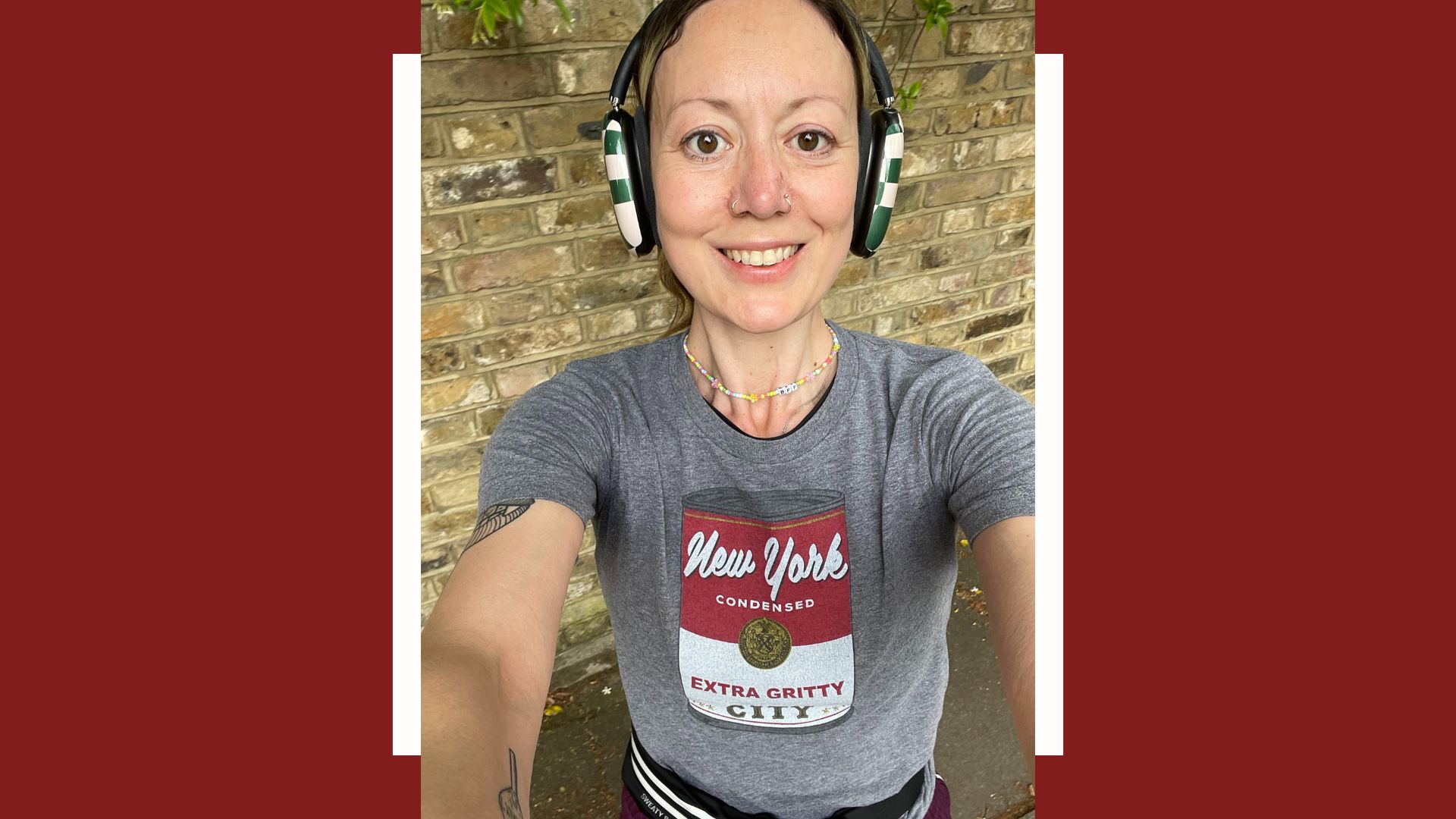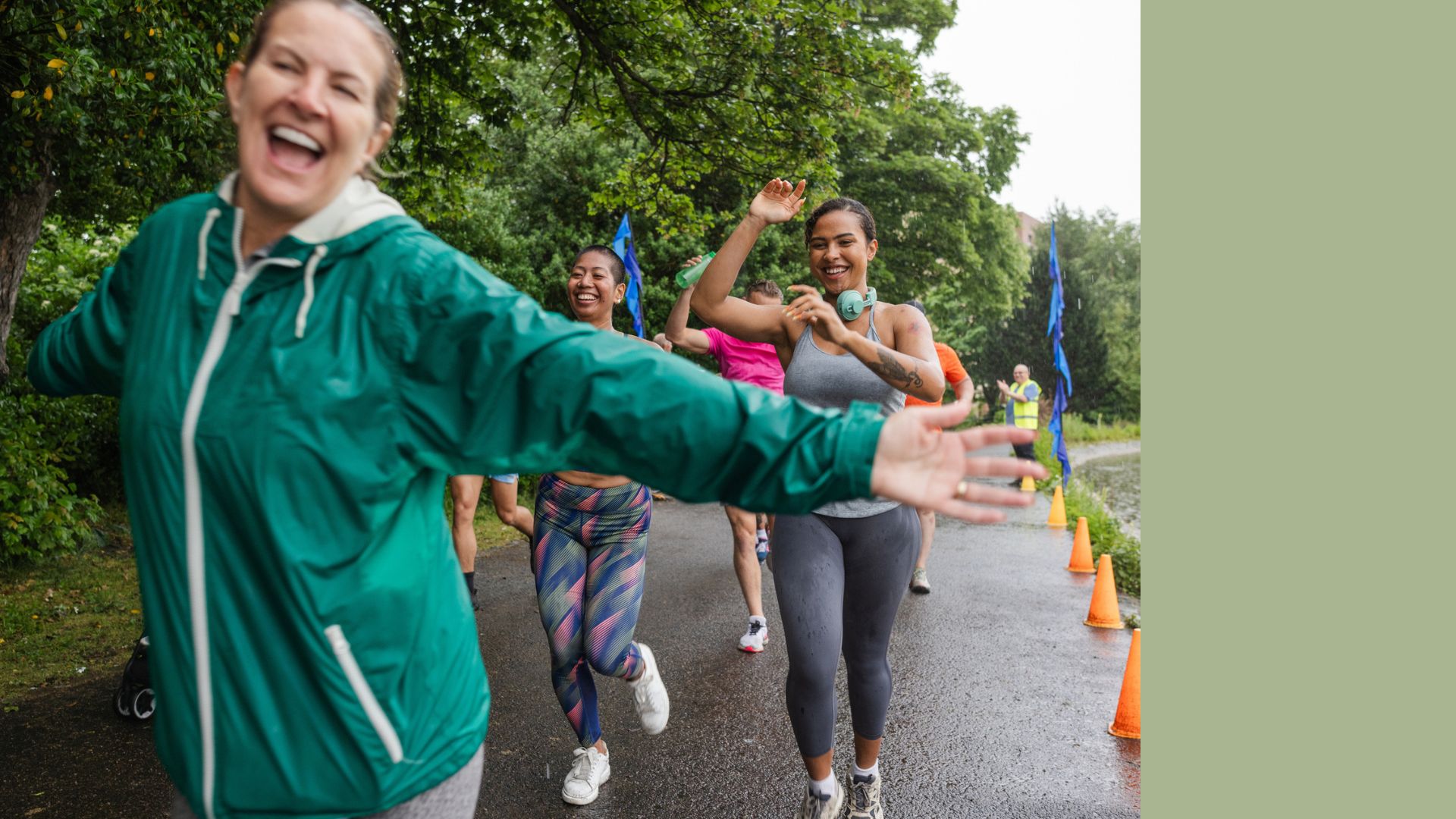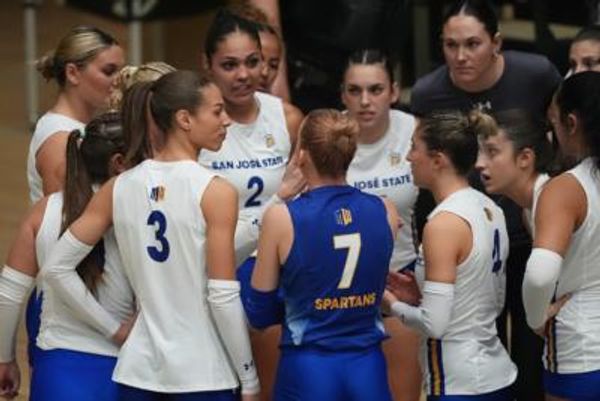
You may have seen that we've officially entered a new era - the era of the running club. Believe it or not, they've become the new dating apps, therapy groups, and the latest must-try way to spend a Friday night. They'll even help you get better at running too, as I discovered.
As someone who’s been running on and off for the past couple of years, I still consider myself a relative newbie to the sport - but I feel confident that going to run clubs pushed me from someone who was managing 20-minute jogs a couple of times a week at maximum to a person who completed a 10K in one hour and nine minutes last month. Not only that - I found new confidence and a way to socialise outside of my norm.
But trust me, just a few years ago, I'd be the last person to join one. While I've always enjoyed working out (and I love my Peloton), the concept of digging out my best running shoes and heading out for a run - let alone a run with others - was the furthest thing from my mind.
Joining a run club in my 40s
Though I now call myself a runner, I never used to. I actively avoided running in my youth and my 20s. By chance, a work commission in my early 30s involved training for a 5k Race for Life event. Once I’d completed the race, I threw my trainers in the back of my wardrobe and didn’t expect to run again.
Then, a few years ago, I decided to start running as a beginner one Christmas. I was in Miami with my half-sister (an avid runner), and I thought it might be fun for us both if I improved my stamina and endurance so I could join her on occasion.
Running along the beach that first morning – sunshine tickling my skin, salty ocean air tingling my nostrils – I felt glorious. I ran for 12 whole minutes, 15 a couple of days later, then 17 a day or two after that. Who knew I loved running? That is until I got back to the UK. Turns out, I only liked running when it was warm, dry, and against a stunning, beachy panorama backdrop.
Last July, eager to get out of the rut of my same-old, same-old routine, I entered a competition and won a challenge that had me try out a variety of fitness events across 31 days. One night, I went to a run club in central London and I felt more nervous showing up for this activity than I did ahead of most others - strange, considering sword fighting and beekeeping were among my events that month.
Once I got to the meeting point though, there was a palpable energy and camaraderie in the group. People were friendly and approachable. Staff handed out electric-lime green shirts for the run - a great equaliser, as it turns out - and I borrowed a pair of trainers. Within minutes, I was chatting to several people, seasoned runners and first-timers alike.

According to Dr Chloe Bedford, a counselling psychologist and avid runner, anxiety ahead of run club events is super common. Factor in my introversion, age (41 at the time, 42 now) and running experience (limited!), I naturally felt anxious ahead of the run.
"There's wanting to go to a running club and being part of something, but also the fear that everybody who goes to a running club must be really good at running. You don't want to be the last one, holding everybody back. I think that creates a lot of anxiety and can be a barrier as well. Lots of run clubs are really friendly, lovely and welcome people of all paces, but there's still that fear and that feeling it's just going to be for younger people,” Dr Bedford says.
She has a point. Everyone I connected with on the night – and everyone I’ve chatted to in subsequent run clubs I’ve attended – has been younger than me. No surprise there. But what I didn’t expect was how little age seemed to matter. I’ve never once felt old, self-conscious about being in my forties, or thought about my age at all during any group runs. The opposite, in fact - in a run club setting, I’m not just a 40-something “mother of so-and-so.” I’m an athlete.
There was a large group of us on the night. Those interested in speed and stats made their way to the front, where I happily stayed towards the back of the group, marvelling at how strangers were clapping and cheering us on as we ran down the middle of London's Regent Street. It was electrifying - and I’m not just talking about our neon-bright tees. I saw London in a completely fresh way and felt part of something bigger than myself.
"In a run club setting, I’m not just a 40-something “mother of so-and-so.” I’m an athlete."
I realised then that other people can be a motivating force when you’re running - the energy of the group helped me keep moving and the social atmosphere was an unexpected bonus. I had fun and who knew I could have fun doing running drills with a bunch of strangers in St James' Park?
For too long, I’d only connected to people in my roles as a mother or writer, so it thrilled me to find common ground with others based on something. I had a chance to chat with a variety of people, and some of those conversations went beyond the superficial – I’m still in touch with some runners I met that night (via social media) a year later.
Running into difficulties
I loved my first run club experience so much that I planned to attend another one right away and I signed up to various clubs I found online. They seemed inclusive, catered to my skill level, and didn't cost a single pound, but there was one problem. Even in London, pretty much every single run club takes place on weekday evenings, after work, or Saturday/Sunday mornings.
As a freelancer with four kids, these times just don’t work well with my schedule. I find it surprising that so few run clubs seem to accommodate people with flexible working arrangements, and hardly any have child-friendly hours. I know from experience that people will attend yoga or reformer Pilates classes mid-morning and early afternoons, so it’s not that the interest wouldn't be there.
I think there’s a particularly keen 40-plus-and-female demographic that these bigger sports brands hosting run clubs can cater to. We're at a pivotal turning point in fitness and wellbeing awareness, whether we're making the space and time to return to a beloved form of exercise, joining a gym or starting strength training in an effort to combat symptoms of perimenopause - and ready to try something new.

Finding consistency
I continued to run on my own but I wasn’t progressing. I’d manage around 2.5km in one stretch, which is about 17 minutes of jogging per session. So, I found a run club that would fit with my schedule.
Ahead of my first session with the new group, I announced that I wasn’t able to run beyond 3km, which felt less embarrassing than attempting the run and collapsing. I braced myself for disappointed groans, but they didn’t come. Instead, everyone kept pace with me (slowing to accommodate my speed, I suspect, but I was grateful for it).
I was so distracted by the chatting I was doing and the scenic loop around Regent’s Canal that I didn’t even realise 42 minutes (over 5km) had passed.
I realised that running is a lot like writing, my day job: you might feel exhausted or unstimulated before doing it, but turning up on the pavement (or the page) regularly made it easier and more enjoyable. I started seeing my progress. I could run faster, and longer. Since I gave up alcohol several months earlier, I seemed to have extra time in my day for my fitness, and I was able to integrate jogging and running with different types of strength training, yoga, and Pilates.
As much as I enjoyed the solitude of my runs and hated to admit that I needed the encouragement and accountability of others, the 42-minute run was the farthest and longest I’d ever run - until I completed 10km for the first time at the Saucony London 10km a couple of months later.
I ran the entire 10K, in one hour and nine minutes. Though my numbers won’t impress most people, I’m immensely proud of the achievement and all of the little ones along the way.
How to find a running club for you
- Prioritise convenience: Find a group local to you that's easy to get to and with a running timetable that works for your schedule. In my experience, this is the most important thing for maintaining consistency and reaping the benefits of running for women.
- Friendly vs competitive: Dr Bedford advises finding a running club which offers a friendly, as opposed to competitive, atmosphere, so look for running clubs which offer social runs. You can normally find the style of running a club by looking at their social media pages.
- Speak to your community: Once I mentioned my blossoming interest in running to others – fellow mums and other friends – they opened up about their own running journeys, injuries and experiences, so I found other people who also enjoyed the sport. One mum at school has even invited me to run with her and some other parents on Tuesday mornings after drop-off.
- Try Park Run: If you want to run with others but not necessarily join a club, try attending a few Park Run events. These free organised runs happen on weekend mornings around the UK and are suitable for all levels, from walkers to sprinters.
- Be honest: I was nervous when I announced to the group I wasn't able to run beyond 3km - but if they didn't know that I was new to running, they probably wouldn't have made the effort to stick to my pace. To avoid injury (and embarrassment), just be honest - you'll find out if it's the right club for you soon enough.
- Look online: Established and new running clubs exist all over the UK. Visit England Athletics' Club Finder or the Good Run Guide's Club Finder and search with your postcode to find one local to you.







